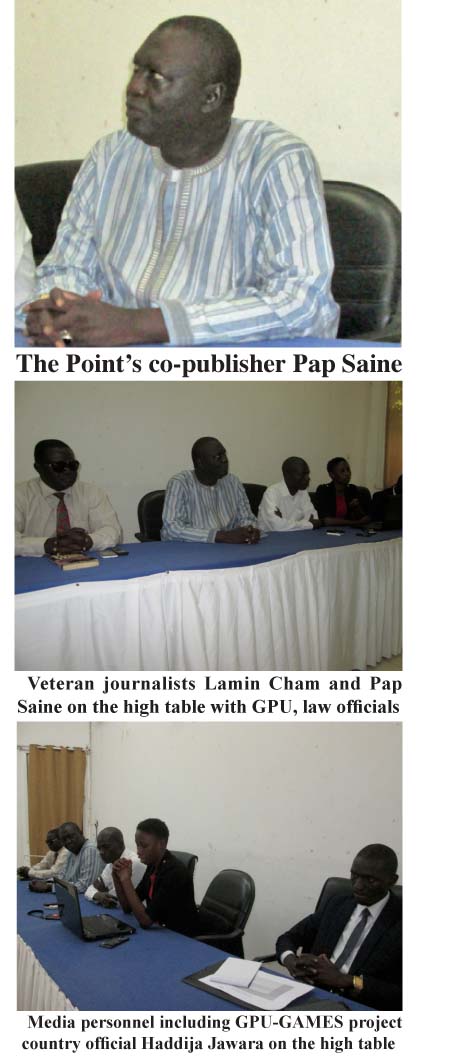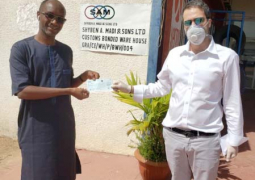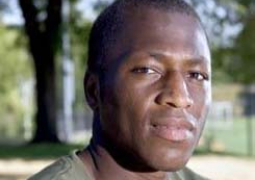
The
co-publisher of The Point, a leading independent newspaper, has renewed
decades-long calls for the Gambia government to do a reform of laws and
policies governing journalism.
Pap
Saine said while there are plausible constitutional guarantees on free speech,
the overbroad and draconic laws regarding defamation, false news and sedition
challenge the enjoyment of constitutionally-guaranteed rights.
He
added: “The Gambia is also a party to international human rights instruments
that protect the right to free speech. Unfortunately, our laws are not in line
with international standards.
“That
is why we, once again, are appealing to the government to do media law reforms
by enacting right to information law and reviewing unfavourable media laws. We
also appeal to the government to open its doors for the media houses to have
access to information, especially now that we are in an election year. Access
to information is important for our democracy and development.”
The
veteran journalist made this call on Thursday as he presided over the official
opening of a two-day seminar on freedom of expression. The event, organised by
the Gambia Press Union, brought together more than two dozen legal
practitioners.
“We
thank the GPU for having the foresight of organising the seminar for members of
the legal fraternity,” Mr Saine said.
“It
is necessary that we build this kind of relationships. There are many issues
that needed to be addressed, but we can only do so when institutions like the
GPU and the legal fraternity come together.”
Gambia
cannot be left out
The
seminar was meanwhile chaired by the president of the Gambia Press Union. Bai
Emil Touray lamented that the prevailing media laws have been brought about by
colonialism, not to establish any genuine order, but to suppress the colonised
Gambians.
He
added that there is thus a trend of countries around the world reforming laws
on free speech, citing a good number of common law jurisdictions that have
decriminalised defamation, as well as repealed sedition, false news and insult
laws.
He
told the participants: “Some of you might know that currently, The Gambia is
the only English-speaking West African country that does not have a right to
information law of sort. Sierra Leone, Nigeria and Liberia all have promulgated
laws on right to information, while The Ghana’s is before the parliament.
“We
as a country need to work towards having one, given that The Gambia has an
international obligation. And, it is our duty as members of the legal and media
fraternity to help guide the government to promulgate a freedom of information
law, since it is in the interest of national development.
“If
we have right to information law in place, it would be easy for all to have
access to information that is of legitimate public interest. The world is
moving and The Gambia cannot afford to be left out.”
More
in the offing
The
seminar is part of a series of workshops and advocacy activities funded for the
Gambia Press Union by the government of Denmark, through a Danish partner
organisation, Gambia Media Support, GAMES.
Haddija
Jawara, deputizing for the GPU-GAMES project manager, said the ‘building
capacity for advocacy’ project has four components, one of which aims to
promote an improved media and policy environment for journalism.
“A
fortnight ago, we had a session with the security forces,” she pointed out.
“Our next target is the National Assembly. To wrap it up, we will have a
national forum on freedom of expression, where we intend to bring together all
stakeholders to discuss issues regarding freedom of speech.”
For
the participants, the engagement of legal practitioners in the promotion of
freedom of expression is very crucial as they are in various ways involved in
the enforcement, as well as protection and promotion of human rights.
Mansour
Jobe, secretary general of the Young Lawyers Association, said: “I am also very
happy to hear that GPU is trying to work with members of the National Assembly,
who are principally assigned with the duty to make laws for this country.”
He
added: “I must say the right of the freedom of expression is one of the most
sacrosanct rights, and that is why this right is even recognised by the 1997
Constitution of The Gambia. What is needed is better enforcement and protection
of these rights, in order to ensure and guarantee the well-being of the Gambian
people.”
Meanwhile,
the world’s latest press freedom reports rank The Gambia as “the worst place”
for journalists in Africa, after Equatorial Guinea and Eritrea.
Read Other Articles In Article (Archive)
State files amended charge in Lamin Waa Juwara and Co trial
Apr 24, 2014, 9:34 AM



